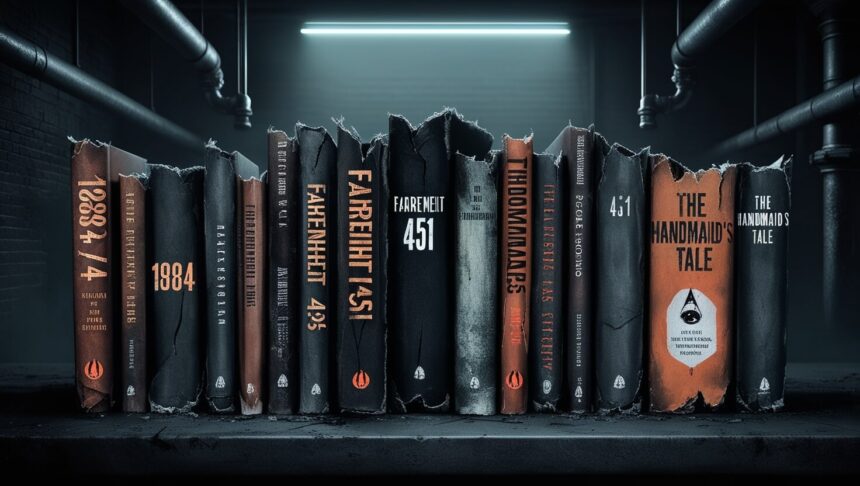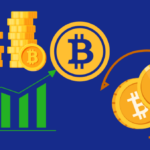In this article, I will discuss the Top Dystopian Books that pull you into chilling yet gripping visions of tomorrow.
Each story digs into control, oppression, and the spark of rebellion, giving fresh glimpses of what people can endure-and inspire.
Spanning timeless classics and recent page-turners, the list points to must-read titles that leave readers thinking long after the final chapter.
Key Point & Top Dystopian Books List
| Book | Key Point |
|---|---|
| Brave New World | A dystopian society driven by technology, conditioning, and loss of individuality. |
| Fahrenheit 451 | A future where books are banned and “firemen” burn them to suppress dissenting ideas. |
| The Handmaid’s Tale | A totalitarian regime controls women’s reproductive rights through religious extremism. |
| The Hunger Games | A brutal televised fight to the death designed to suppress rebellion in a dystopian society. |
| Divergent | A society divided into factions based on virtues, with a protagonist challenging conformity. |
| The Giver | A seemingly perfect community that eliminates pain by suppressing emotions and memories. |
| Animal Farm | An allegory of political revolution showing how power corrupts through farm animals. |
| Red Rising | A rebellion led by a lower-class miner in a rigidly stratified future society on Mars. |
| Oryx and Crake | A post-apocalyptic world shaped by genetic engineering and ecological collapse. |
| Never Let Me Go | Clones raised for organ donation question the morality of their existence. |
1.Brave New World
Aldous Huxleys Brave New World earns its spot as a must-read dystopian novel because it paints a future where machines and science dictate almost every detail of daily life, starting at test-tube birth and stretching to routine thoughts and actions.
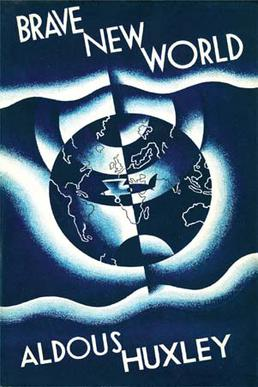
The books striking picture of a culture hooked on glam consumption, synthetic joy, and cookie-cutter identities feels eerily relevant more than ninety years after its release. Instead of hammering people into submission with fear, Huxley shows power at play through endless pleasure and Pavlovian training, leaving readers to ponder how fragile freedom and basic humanity can really be.
| Feature | Details |
|---|---|
| Title | Brave New World |
| Author | Aldous Huxley |
| Genre | Dystopian Fiction |
| Unique Aspect | Society controlled through technology, conditioning, and artificial happiness |
| Key Theme | Loss of individuality and freedom through pleasure and conformity |
| Publication Year | 1932 |
| Cultural Impact | Influential critique of consumerism and state control |
| Notable Adaptations | Film, TV series, radio drama |
2.Fahrenheit 451
Ray Bradburys Fahrenheit 451 ranks among the best dystopian novels mainly because it shows a future where books are outlawed and ideas are kept in chains.
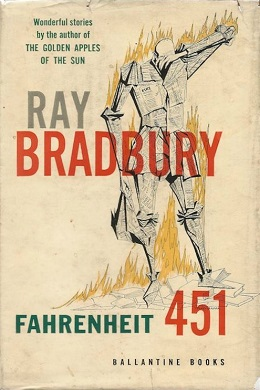
By zeroing in on censorship, the story warns us that neglecting clear-eyed thinking can hand over power to those eager to shut down questions. Its picture of a society hooked on mindless screens and scared of new thoughts still hits home today, reminding readers how quickly freedom slips away when access to knowledge burns away.
| Feature | Details |
|---|---|
| Title | Fahrenheit 451 |
| Author | Ray Bradbury |
| Genre | Dystopian Fiction |
| Unique Aspect | Censorship through book burning to suppress knowledge |
| Key Theme | Danger of losing intellectual freedom and critical thought |
| Publication Year | 1953 |
| Cultural Impact | Powerful warning against censorship and anti-intellectualism |
| Notable Adaptations | Film, stage plays, graphic novel |
3.The Handmaid’s Tale
The Handmaids Tale ranks near the top of dystopian fiction because it shows a world where a religious government erases every woman s right. By zeroing in on gender oppression and the tight grip on reproduction, Margaret Atwood warns readers what can happen when bodily freedom vanishes.
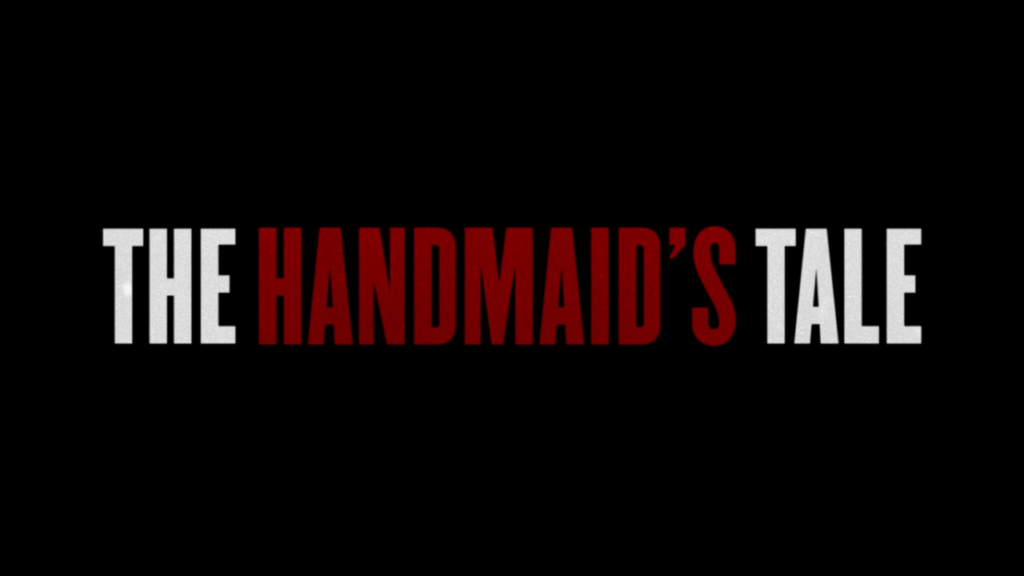
The books cold picture of fear, rule, and forced sameness sparks tough questions about power, push-back, and simply staying alive, questions that still echo in today s talks about rights and liberty.
| Feature | Details |
|---|---|
| Title | The Handmaid’s Tale |
| Author | Margaret Atwood |
| Genre | Dystopian Fiction |
| Unique Aspect | Female reproductive control under a theocratic regime |
| Key Theme | Gender oppression and loss of bodily autonomy |
| Publication Year | 1985 |
| Cultural Impact | Influential critique of patriarchy and authoritarianism |
| Notable Adaptations | TV series, opera, stage plays |
4.The Hunger Games
One of the best dystopian novels is The Hunger Games, which depicts a society in which ruthless, state-sponsored violence masquerading as entertainment is used to uphold oppression. Its singular emphasis on the spectacle of the lethal games exposes the ways in which authority uses diversion and terror to manipulate the populace.
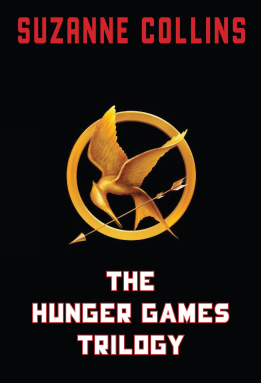
A intriguing and timely examination of control and resistance in a dystopian future, the story’s blend of survival, rebellion, and media manipulation presents a compelling critique of inequity and desensitization.
| Feature | Details |
|---|---|
| Title | The Hunger Games |
| Author | Suzanne Collins |
| Genre | Dystopian Fiction |
| Unique Aspect | State-sponsored deadly games as a tool for oppression |
| Key Theme | Control through fear, inequality, and media manipulation |
| Publication Year | 2008 |
| Cultural Impact | Popularized dystopian YA genre with themes of rebellion |
| Notable Adaptations | Successful film series |
5.Divergent
Divergent stands out among dystopian novels because it imagines a world split into strict factions, each based on one single personality trait; people must fit into these boxes or lose everything.
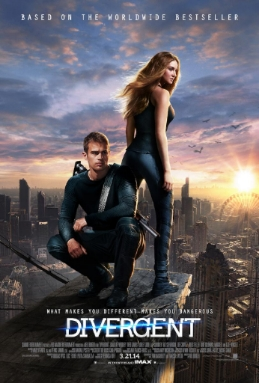
By zooming in on identity, the story warns us what can happen when society refuses to accept the messiness of being human and pushes everyone to act the same. As Tris learns to question the system, her path shows that freedom, real choice, and the courage to be multiple things at once can ultimately break even the tightest control.
| Feature | Details |
|---|---|
| Title | Divergent |
| Author | Veronica Roth |
| Genre | Dystopian Fiction |
| Unique Aspect | Society divided into factions based on personality traits |
| Key Theme | Identity, conformity, and rebellion |
| Publication Year | 2011 |
| Cultural Impact | Popularized faction-based societal structure in YA dystopia |
| Notable Adaptations | Film trilogy |
6.The Giver
The Giver earns its place as a must-read dystopian novel because it shows a shiny, well-ordered community that wipes out pain and argument by locking away strong feelings and all memories.
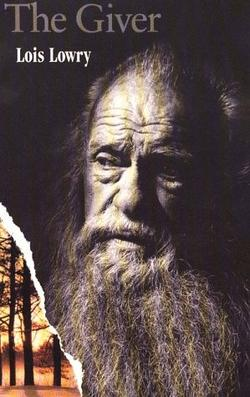
This unusual take on enforced sameness proves that trading originality and true emotion for safety can, in the end, rob people of their very humanity.
As the main character slowly wakes up to the wide range of life-senses, the tale questions whether soft comforts are really worth the loss of freedom, offering readers a deep look at the ongoing tug-of-war between security and self.
| Feature | Details |
|---|---|
| Title | The Giver |
| Author | Lois Lowry |
| Genre | Dystopian Fiction |
| Unique Aspect | A society that suppresses emotions and memories for order |
| Key Theme | The cost of enforced sameness and loss of individuality |
| Publication Year | 1993 |
| Cultural Impact | Widely taught as a thought-provoking young adult novel |
| Notable Adaptations | Film adaptation (2014) |
7.Animal Farm
Animal Farm sits near the top of the dystopian shelf because its easy-to-grasp farm world shows, in plain terms, how power twists good plans and turns leaders into tyrants.

By working as an allegory, the tale lets readers watch lofty revolutionary dreams slide off course the moment a hungry few grab the reins. Its sharp, open scenes of trickery, slogans, and rising inequality serve as a lasting alarm about any system that promises justice yet quietly robs the people it says it defends.
| Feature | Details |
|---|---|
| Title | Animal Farm |
| Author | George Orwell |
| Genre | Political Satire / Dystopian Fiction |
| Unique Aspect | Allegory of revolution and corruption using farm animals |
| Key Theme | Power, propaganda, and betrayal of ideals |
| Publication Year | 1945 |
| Cultural Impact | Classic critique of totalitarian regimes |
| Notable Adaptations | Film, stage plays |
8.Red Rising
Red Rising ranks near the top of modern dystopian novels because it paints a brutal picture of a future Mars run by color-coded social ranks. That bright, bloody backdrop mixes hard science fiction with a raw rebellion that shows just how cruel systems of oppression can be-and why people risk everything to tear them down.

As the story zeroes in on sacrifice, clever planning, and open revolt against the mighty, readers embark on a fast, gripping ride through power, identity, and the spark of revolution in a rigid, harsh world.
| Feature | Details |
|---|---|
| Title | Red Rising |
| Author | Pierce Brown |
| Genre | Dystopian Science Fiction |
| Unique Aspect | Society divided by rigid color-coded class hierarchy |
| Key Theme | Rebellion, social inequality, and revolution |
| Publication Year | 2014 |
| Cultural Impact | Known for blending dystopia with epic sci-fi adventure |
| Notable Adaptations | Planned film and TV adaptations |
9.Oryx and Crake
Oryx and Crake stands out in the dystopian genre because it paints a chilling picture of a world ruined by genetic tinkering and a damaged planet.
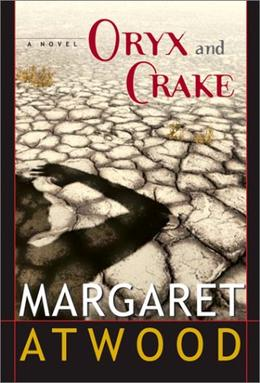
Rather than dwelling on broad disasters, it zeroes in on what happens when science runs wild and people worship control above all else. Told through one young mans heartbreaking fight to survive, the story pushes readers to question where moral lines should go and how easily progress can tip into ruin.
| Feature | Details |
|---|---|
| Title | Oryx and Crake |
| Author | Margaret Atwood |
| Genre | Dystopian Science Fiction |
| Unique Aspect | Explores genetic engineering and ecological collapse |
| Key Theme | Ethics of science, human impact, and survival |
| Publication Year | 2003 |
| Cultural Impact | Highlights dangers of unchecked scientific experimentation |
| Notable Adaptations | None notable |
10. Never Let Me Go
Never Let Me Go ranks among the best dystopian novels because, without shouting, it shows a world where human clones grow up just to donate organs. Through this calm yet chilling setup, the story asks big moral questions that stick with readers.
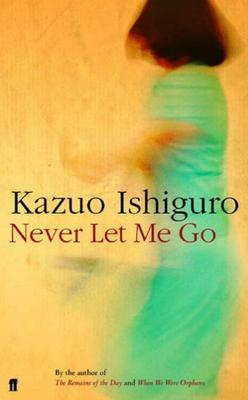
By centering on memory, identity, and how quickly life can be cut short, Kazuo Ishiguro gives us a tender yet haunting look at what it really means to be human in a cold, controlled system.
| Feature | Details |
|---|---|
| Title | Never Let Me Go |
| Author | Kazuo Ishiguro |
| Genre | Dystopian Science Fiction / Literary Fiction |
| Unique Aspect | Clones raised for organ donation explore identity and humanity |
| Key Theme | Ethics, memory, and the value of life |
| Publication Year | 2005 |
| Cultural Impact | Acclaimed for its subtle, emotional dystopian storytelling |
| Notable Adaptations | Film adaptation (2010) |
Conclusion
Dystopian novels pull us in by picturing future worlds where the worst parts of society take over. Every tale shows a fresh angle on power, loss of freedom, and the fight to push back, making us think about how much we value our rights and who we really are.
Such books do more than entertain; they sound a loud alarm that warns us to stay alert against people or systems that seek to strip away our dignity. For anyone curious about the tricky paths the future might hold, these stories are still must-reads.


